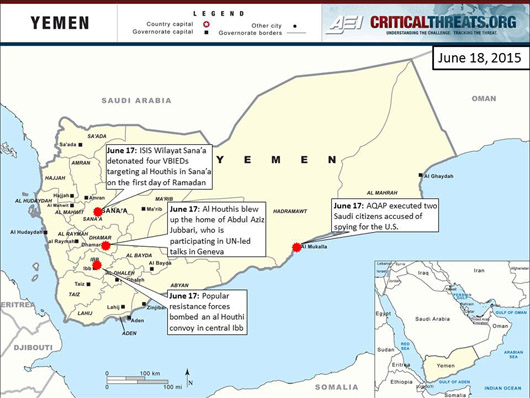Islamic State in Iraq and al Sham (ISIS) militants detonated four bombs targeting al Houthis in Sana’a, the second time ISIS has carried out a spectacular attack on the al Houthis in Yemen. The attack may mark the beginning of an ISIS Ramadan offensive in Yemen and will likely inflame sectarian tensions with the al Houthis.
ISIS militants continue to attempt to inflame sectarian tensions with the al Houthis. ISIS Wilayat Sana’a militants detonated four vehicle-borne improvised explosive devices targeting al Houthis sites in the capital, Sana’a, on June 17, the first day of the Islamic holy month of Ramadan. The attacks hit two mosques, an al Houthi member’s home, and the political headquarters of the al Houthi movement. ISIS Wilayat Sana’a quickly claimed credit for the attack via a statement distributed through Twitter. This is ISIS’s second spectacular attack in Yemen this year. ISIS Wilayat Sana’a carried out a similar attack targeting al Houthis in Sana’a and Sa’ada on March 20. The attack is likely meant to goad the al Houthis into overreacting and cracking down further on Salafists or suspected ISIS or al Qaeda sympathizers.
UN-led peace talks in Geneva are unlikely to succeed as both sides refuse to compromise. The UN has extended the political talks until at least June 19 as the talks continue to make little progress. Both the al Houthis and Abdu Rabbu Mansour Hadi’s government are accusing each other of attempting to undermine the talks. Al Houthi delegates stated that Hadi’s government is demanding the militants retreat from Aden and Taiz, which the al Houthis hold as unacceptable conditions and Hadi’s government considers a non-negotiable demand. The al Houthis are also rejecting calls for them to decrease their delegation, which includes politicians loyal to former President Ali Abdullah Saleh and belonging to the General People’s Congress, from 22 delegates to ten. Al Houthi leader Abdul Malik al Houthi also accused Israel, America, and Saudi Arabia of trying to impose their agendas on the Geneva talks. Meanwhile, Al Houthi militants in Yemen bombed the house of delegate Abdul Aziz Jubbari in Dhamar on June 17. Jubbari is currently participating as part of Abdu Rabbu Mansour Hadi’s government delegation in the Geneva talks. The attack was likely meant to intimidate Jubbari and inflame tensions at the Geneva dialogue.
Al Qaeda in the Arabian Peninsula (AQAP) is cracking down on suspected spies after emir Nasser al Wahayshi’s death. AQAP militants executed two Saudi citizens accused of spying for the U.S. on June 17 in al Mukalla, Hadramawt, and posted images of the execution on social media. AQAP, which has executed suspected spies previously, may feel under pressure after the loss of four senior leaders in the past six months. Separately, the Washington Post reports that the airstrike that killed Wahayshi was not targeting him, but was part of an expansion of the U.S. drone program that includes targets based on militant activity patterns.
Popular resistance fighters are increasingly targeting al Houthi convoys moving reinforcements in south-central Yemen. Popular resistance fighters ambushed an al Houthi convoy in Ibb on June 15, killing 15 al Houthi militants, in one of the deadliest ambushes the forces have carried out in recent weeks. Anti-al Houthi fighters also attacked an al Houthi convoy carrying reinforcements to Taiz city in Naqil Samara in central Ibb on June 16. The attacks come as the al Houthis are starting to lose some territory in Taiz and Lahij to anti-al Houthi forces. Separately, the al Houthis continue to attack Saudi territory with artillery fire along the Saudi-Yemeni border.
Anti-al Houthi politicians are calling for the return of General Ali Mohsen al Ahmar to fight the al Houthis. Al Jawf’s governor Mohammed Salem bin Abud has also called for the return of Yemeni Major General Ali Mohsen al Ahmar to Yemen in order to unify and lead popular resistance forces against the al Houthis. Ali Mohsen al Ahmar previously commanded Yemeni military forces during the Sa’ada Wars against the al Houthis in 2004-2010. Previous unconfirmed reporting indicated that Ali Mohsen was in Ma’rib, central Yemen, although his last known location was in Saudi Arabia. Separately, the al Houthis recently seized the capital of al Jawf and looted the house of the commander of the 115th Infantry Brigade.
ISIS’s attack on the al Houthis may push the al Houthis to have a strong military reaction and crack down on Sunni dissenters. Such a scenario will undermine ongoing attempts at a political solution to Yemen’s conflict and will add a dangerous sectarian dimension to the conflict. Saudi Arabia may also be tempted to increase military operations against the al Houthis should the group increase its attacks. Such a scenario would weaken the al Houthis, which is the only group currently fighting ISIS in Yemen.
← PREVIOUS |
NEXT → |

